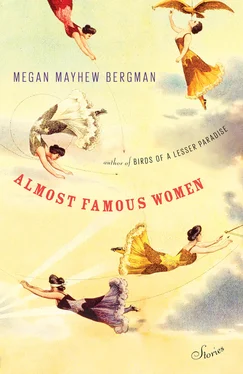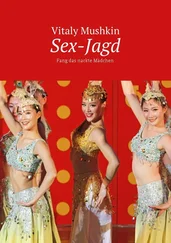Summer smiled. The sun, and there was too much of it, caught in her hair, lit it up like pale stained glass.
“We don’t have any nets to spare,” Clare said without looking up from the rockfish she was skinning, blade expertly snaking underneath the scaled flesh. When she did look up, gazing out of the window, she could see the men at the fountain, smoking, browned from working all summer long on the artificial reef, which they’d fashioned out of the timbers and iron that washed ashore from a shipwreck they figured sat just east of the island; the pieces tumbled toward them in the strong western current. Though they rarely wore shirts they began pulling them on, and though it was forbidden she knew many of them had stuffed their pockets with gull jerky and marmalade.
But not Javier Lewis, she thought. Javier, hardly twenty, was honorable, and that’s why she tolerated this talk of weddings, because he and Summer were the future of Timothy. They respected tradition and understood what had to be done. She could see Summer looking for him through the big windows, in between feeding empty shells to Lela underneath the table. Clare imagined Summer and Javier with a child. Surely it would be a towheaded baby, kissed constantly, worn on Summer’s back as she waded into the water to fish.
“Okay, girls, let’s wrap up,” Clare said, rising from the wooden table. She plunged the hunks of rockfish into a bucket of brine. As she stood she ducked the emergency rations, salted fish dangling from twine overhead like strange ornaments, drying in the harsh sunlight. She wiped her hands on a towel and left the picking house. She could feel the men’s eyes on her as she walked to her house, June close behind, the sound of her bare feet on the sand barely perceptible. A mother knows the sound of her own child, she thought.
“You get the basket and I’ll get the shells,” Clare said. She opened the cabinet and retrieved the large white enamel bowl her mother had brought over on the boat, the only boat to have landed at Timothy in fifty years. For years she’d waited for the boat to come back, as her parents had done, hoping that exile applied to only one generation. But here she was, living in someone else’s vacation home built centuries ago, the last of the books rank and spotted with mildew, food scarce, and many of the villagers suffering from malnutrition and melanomas. Here she was, trying to remember her mother’s stories about shampoo, television, and shopping malls.
June, always compliant, had prepared the basket of food that morning: three roasted and salted gulls, five oranges, two jars of marmalade, and two bottles of boiled rainwater. June checked it over one last time, added another jar of marmalade, and scooped the handle over her shoulder.
Clare paused at the door of her home and took a deep breath, bracing herself. She reached for June’s hand and squeezed it, their skin warm, their hands callused. As they stepped outside into the humid air, the village stared back at them from the fountain. They were talking — she heard bits and pieces of conversation about nori and oysters, a shark that had been spotted near the reef — but she couldn’t help but notice the way the conversation died as the door of her house creaked open.
Clare could see Javier standing next to Summer Hutchison and her father, Jim, who managed the rainwater plant. She nodded at everyone and walked toward the fountain with the enamel bowl balanced on her hip. Without being told, June walked quickly down to the beach to set the food basket by the pile of driftwood and rope, knowing instinctively that there wouldn’t be time after the lottery.
Clare looked down at her daughter’s silhouette on the beach, skinny and browned, long auburn braid hanging down her back. June had placed the basket next to the driftwood but was staring at Hope House, a distant, skeletal structure falling into the ocean, standing on rickety posts as waves crashed against the front door at high tide. The second summer of exile a big storm had come and taken the easternmost end of the island and a row of waterfront homes on the central beach, and Hope House, nearly a mile offshore, was all that remained of East Timothy. No one boated or swam out there anymore; the fishing was good, but the sharks were numerous and the boats weren’t reliable.
“Let’s move on with it, Clare,” Jim Hutchison said.
Clare was thinking about how the big storm happened the year that the elders decided there were too many mouths to feed. She looked up at Jim. There was the sound of wingbeats and the black swarm of dragonflies moved over them, there and gone as they often were. The sound jarred her into the present.
“We’ll take our time,” Clare said, setting the bowl on the edge of the fountain. She wanted to keep proceedings calm; it was the only way to avoid a dangerous frenzy, to maintain control.
“Easy for you to say — you’re exempt!” Huck Sleeman said, one tattooed arm around Jade. Lela played at their feet with a doll made of seaweed, sticks, and a square from an old quilt.
It was true. Clare’s mother, Jennifer, had saved the exiles with agriculture. She’d coaxed saltwater rice paddies, orange trees, and surprising gardens from the island, which she tended to with rainwater and burlap guards to reduce salt burns. While the men had wasted their time building a boat that would never be seaworthy, Jennifer had accepted their plight and started the women’s co-op, outlining a rigorous fishing schedule. She was a midwife, a nurse, a leader, and because of her contributions to an improved life on Timothy, Clare and June were exempt from the lottery, and their matriarchal line was considered the closest thing the island had to a monarchy. Being exempt from the lottery was a relief but it was also a burden, a guilty feeling, and Clare had spent the last month filled with a sense of unease, hot and sleepless in her bed.
Jennifer. To even think of her mother’s name harkened to a different time and a mainland no one but Bruce Haverford knew. Bruce with his long white beard and rambling stories about baseball. He was seventy-five now, and sat in his flimsy lawn chair with its rusted joints, waiting for her to start. She made eye contact with him as she unfolded the list. He nodded curtly.
“I’ll start with the heads of households,” she said. “When I call your name, each member of the household will draw a shell.”
“Formalities,” Huck said. Clare felt as though she could see a snarl on his face, and it reminded her of what she’d worried over in bed these last nights when she couldn’t sleep: how precarious her position was here on the island, her daughter’s. What if people decided they wanted a new way? All she had on her side was tradition. Not brute force, not divine right, and luck — God, to speak of luck on this island was to lie. No one here knew luck, save for a good fishing day.
Just as Clare turned to offer the first shell she saw Summer’s mother, Beth Hutchison, hurrying up the sandy path to the village square, her thick gray hair held back by a red scarf. She held her youngest daughter Kate’s hand. Beth locked arms with Jim and touched Summer on the back. “I let the day get away from me,” she whispered. “I forgot. How could I forget?”
Javier nodded at Beth politely. His eyes returned quickly to Summer. He was thinking of the hushed nights when he had come to her in the shallow, dark water and they’d stood there alone looking out at the dim horizon. She worried about her future, as they all worried, and he assured her that if things got bad she could make it on her own, that he would come join her, that nothing could keep her from him. He reached for her hand and held it tightly.
“Thought we’d have to start without you, Beth,” Jade said.
Читать дальше












